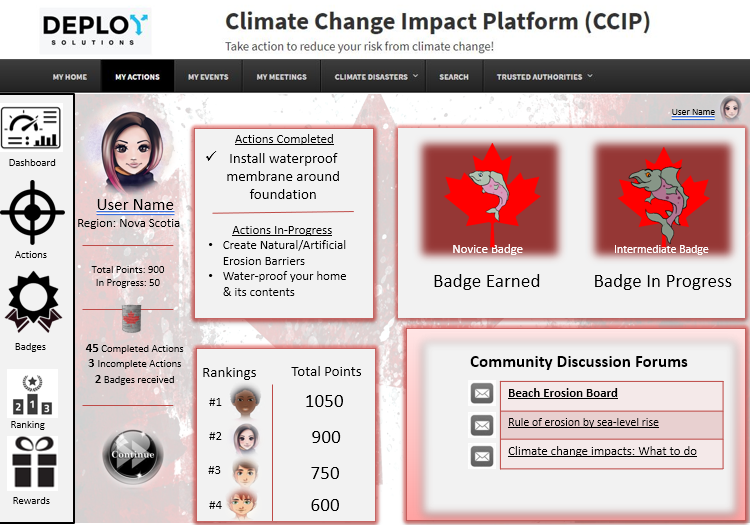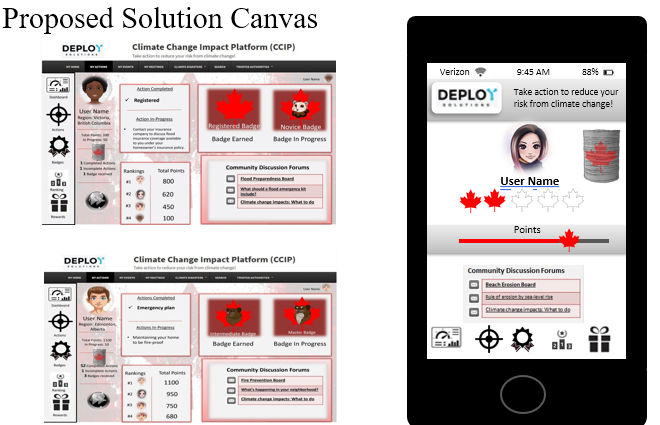Projects
CC12 - Gamification Study and Recommendations for Climate Change Impact Software
Project start and end dates:
2020-01-13 to 2020-03-22
We are in the design and planning phase of a new climate change impact planning website (related to “UN Sustainable Development Goal 13: Take urgent action to combat climate change and its impacts”). The portal will recommend a set of actions that ordinary citizens can take to avoid, mitigate, adapt, or rebuild from climate change disasters. In order to make it attractive and fun to use, we would like to add gamification (points, badges, levels, social feedback, etc). We would like assistance coming up with research on gamification concepts and systems and then a proposed gamification system to suit our application (ex points for doing actions in your house to protect against climate disaster, badges for being prepared for a certain type of disaster).


The Capella students were tasked with producing a gamification model and techniques that will be used in a climate change software portal and mobile app. The gamification feature needs to encourage citizens to perform certain tasks (both as individuals and within a community).
While the project work was intended to be an early prototype, the team produced results of exceptional quality.
During their detailed research effort they explored many potential gamification models, techniques and software frameworks. They produced a gamification canvas and detailed set of recommendations for system mechanics including badges, levels, leaderboards (with lovely custom graphics!). They approached gamification software providers to evaluate which products could deliver their proposed model. And they identified the legal and ethical requirements and considerations.
Their recommendations are well-researched, practical, and logical. Just as importantly, their proposed gamification model is whimsical, fun, and highly personalized to Canadian culture and national identity.
Overall the team’s result exceeded our expectations and is a great credit to them!
Thank
You!
We would like to thank Jordan Marsters, Mark Cain, Melissa Freeman, Kametra Harrison, Jason Music, Jason Finamore , and the other students and teaching staff of IT4990 – Capstone Winter course. *
* For privacy reasons, we only list people who gave us permission to do so. Did you contribute to this project? Contact us to be added!
Related Project
Software can help the world respond to climate change impacts and disasters.
In 2019 we set out to investigate if there is a need for a solution that gives citizens personalized help preparing for and recovering from climate change impacts and lets trusted authorities assist them and report on their results.
As part of this effort, a great deal of market and technical research was conducted over the last few years. Over 140 students have been involved so far, in dozens of academic institutions in Canada and internationally.
Our greatest finding is the willingness of citizens to take responsibility and help themselves, their neighbors and community plan for, mitigate and recover from climate change impacts and disasters. We also confirmed that a software solution can be built to help overcome the barriers they face when trying to do so.
Now we’re working on a prototype and sharing our findings and progress. Find out more on our OASIS project website!
A Riipen Project

Riipen is your online platform for virtual project-based learning
Get hands-on support from our students through an in-class project or virtual internship.
- In-class projects allow you to connect with one of our educators to embed your project into the students’ curriculum. Become the real-life case study for students in the classroom!
- Virtual internships are similar to in-person internships, except they are project-based with a clear outcome and the engagement is primarily done online.


